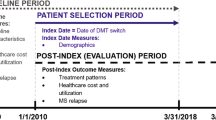Abstract
Background
Adherence to disease-modifying therapies (DMTs) is essential for the reduction of multiple sclerosis (MS) progression and relapse. However, only limited data currently exist on the impact of treatment adherence on MS-related clinical and economic outcomes in the real world setting.
Objective
To assess the impact of treatment adherence on MS-related hospitalizations (inpatient [INP]), ER visits, MS relapses, and medical costs.
Design/Methods
Patients with ≥1 ICD-9-CM code for MS who received ≥1 DMT between July 1, 2004 and June 30, 2008 were identified using the administrative claims database. The first DMT received during the study period was defined as the index treatment and ≥6-month preindex and ≥12-month postindex continuous health-plan enrollment were required for inclusion. Adherence was assessed using the medication possession ratio (MPR); patients with MPR ≥80% were regarded as adherent. Multivariate analyses were used to evaluate the impact of adherence on MS-related outcomes after controlling for baseline demographic and clinical characteristics.
Results
In this cohort (n=2446), 59.6% of the patients were adherent to their DMT. Compared with the nonadherent group, adherent patients were significantly less likely to have MS-related INP (odds ratio [OR]: 0.63, 95% confidence interval [CI], 0.47–0.83) and MS relapses (OR: 0.71, 95% CI, 0.59–0.85). No significant difference was found in ER risk between adherent and nonadherent groups (8.4% vs. 10.5%, P=0.068, OR: 0.80, 95% CI: 0.60–1.07). On average, the adherent group incurred lower medical costs than the nonadherent group ($3380, 95% CI, $3046–$3750 vs. $4348, 95% CI, $3828-$4940, P=0.003).
Conclusion
Treatment adherence is associated with better clinical and economic outcomes including lower risks for MS-related hospitalization, MS relapse, and less MS-related medical costs. Treatments that require infrequent administrations and have favorable adherence profiles may benefit patients who are unable to adhere to DMT therapies. Such treatments may be important in improving disease outcomes and may be suitable therapeutic candidates for the management of MS.
Similar content being viewed by others
References
National Multiple Sclerosis Society [online]. 1. Available from URL: http://www.nationalmssociety.org/about-multiple-sclerosis. Accessed March 5, 2010.
Frohman EM. Multiple sclerosis. Med Clin North Am. 2003;87:867–868ix.
Kantarci O, Wingerchuk D. Epidemiology and natural history of multiple sclerosis: new insights. Curr Opin Neurol. 2006;19:248–254.
Goodin DS, Frohman EM, Garmany GP, Jr., et al. Disease modifying therapies in multiple sclerosis: report of the Therapeutics and Technology Assessment Subcommittee of the American Academy of Neurology and the MS Council for Clinical Practice Guidelines. Neurology. 2002;58:169–178.
Lubin F, Baier M, Cutter G. Effect of relapses on development of residual deficit in multiple sclerosis. Neurology. 2003;61:1528–1532.
Osterberg L, Blaschke T. Adherence to medication. N Engl J Med. 2005;353:487–497.
Mohr DC, Goodkin DE, Masuoka L, et al. Treatment adherence and patient retention in the first year of a Phase-III clinical trial for the treatment of multiple sclerosis. Mult Scler. 1999;5:192–197.
Ross AP. Tolerability, adherence, and patient outcomes. Neurology. 2008;71:S21–S23.
Ruggieri RM, Settipani N, Viviano L, et al. Long-term interferon-beta treatment for multiple sclerosis. Neurol Sci. 2003;24:361–364.
Patti F. Optimizing the benefit of multiple sclerosis therapy: the importance of treatment adherence. Patient Prefer Adherence. 2010;4:1–9.
Tremlett HL, Oger J. Interrupted therapy: stopping and switching of the beta-interferons prescribed for MS. Neurology. 2003;61:551–554.
Comi G. Shifting the paradigm toward earlier treatment of multiple sclerosis with interferon beta. Clin Ther. 2009;31:1142–1157.
Flachenecker P, Rieckmann P. Early intervention in multiple sclerosis: better outcomes for patients and society? Drugs. 2003;63:1525–1533.
Andrade SE, Kahler KH, Frech F, Chan KA. Methods for evaluation of medication adherence and persistence using automated databases. Pharmacoepidemiol Drug Saf. 2006;15:565–574.
Cramer JA, Roy A, Burrell A, et al. Medication compliance and persistence: terminology and definitions. Value Health. 2008;11:44–47.
Castelli-Haley J, Oleen-Burkey M, Lage MJ, Johnson KP. Glatiramer acetate versus interferon beta-1a for subcutaneous administration: comparison of outcomes among multiple sclerosis patients. Adv Ther. 2008;25:658–673.
Castelli-Haley J, Oleen-Burkey MA, Lage MJ, Johnson KP. Glatiramer acetate and interferon beta-1b: a study of outcomes among patients with multiple sclerosis. Adv Ther. 2009;26:552–562.
Ollendorf DA, Jilinskaia E, Oleen-Burkey M. Clinical and economic impact of glatiramer acetate versus beta interferon therapy among patients with multiple sclerosis in a managed care population. J Manag Care Pharm. 2002;8:469–476.
Ollendorf DA, Castelli-Haley J, Oleen-Burkey M. Impact of co-prescribed glatiramer acetate and antihistamine therapy on the likelihood of relapse among patients with multiple sclerosis. J Neurosci Nurs. 2008;40:281–290.
Steinberg SC, Faris RJ, Chang CF, et al. Impact of adherence to interferons in the treatment of multiple sclerosis: a non-experimental, retrospective, cohort study. Clin Drug Investig. 2010;30:89–100.
Roter DL, Hall JA, Merisca R, Nordstrom B, Cretin D, Svarstad B. Effectiveness of interventions to improve patient compliance: a meta-analysis. Med Care. 1998;36:1138–1161.
Klauer T, Zettl UK. Compliance, adherence, and the treatment of multiple sclerosis. J Neurol. 2008;255(Suppl. 6):87–92.
Ginsburg PB, Strunk BC, Banker MI, Cookson JP. Tracking health care costs: continued stability but at high rates in 2005. Health Aff (Millwood). 2006;25:w486–w495.
Brandes DW, Callender T, Lathi E, O’Leary S. A review of disease-modifying therapies for MS: maximizing adherence and minimizing adverse events. Curr Med Res Opin. 2009;25:77–92.
Costello K, Kennedy P, Scanzillo J. Recognizing nonadherence in patients with multiple sclerosis and maintaining treatment adherence in the long term. Medscape J Med. 2008;10:225.
Treadaway K, Cutter G, Salter A, et al. Factors that influence adherence with disease-modifying therapy in MS. J Neurol. 2009;256:568–576.
Tan H, Yu J, Tabby D, Singer J. Clinical and economic impact of a specialty care management program among patients with multiple sclerosis: a cohort study. Mult Scler. 2009;16:956–963.
Saini SD, Schoenfeld P, Kaulback K, Dubinsky MC. Effect of medication dosing frequency on adherence in chronic diseases. Am J Manag Care. 2009;15:e22–33.
Author information
Authors and Affiliations
Corresponding author
Rights and permissions
About this article
Cite this article
Tan, H., Cai, Q., Agarwal, S. et al. Impact of adherence to disease-modifying therapies on clinical and economic outcomes among patients with multiple sclerosis. Adv Therapy 28, 51–61 (2011). https://doi.org/10.1007/s12325-010-0093-7
Received:
Published:
Issue Date:
DOI: https://doi.org/10.1007/s12325-010-0093-7




